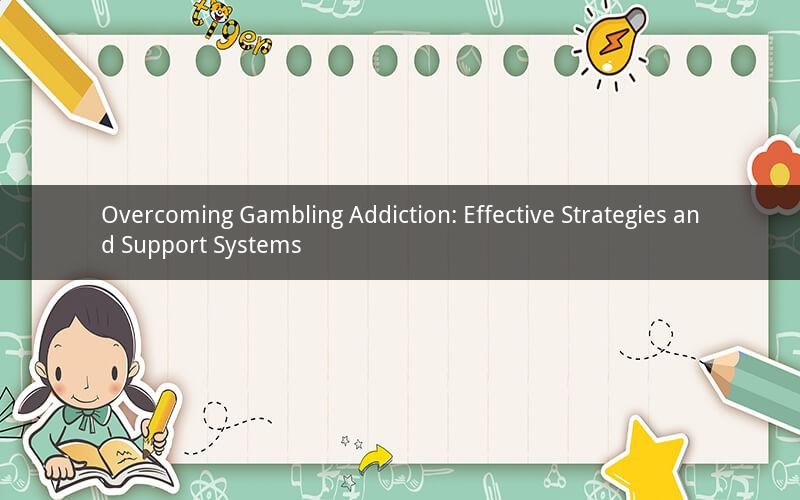
Gambling addiction, also known as compulsive gambling or problem gambling, is a serious issue that affects millions of individuals worldwide. It can lead to financial, emotional, and social consequences, making it crucial to find ways to stop this addiction. This article aims to provide practical strategies and support systems that can help individuals struggling with gambling addiction to overcome it.
Understanding Gambling Addiction
To begin with, it's essential to understand what gambling addiction is and how it affects the individual. Gambling addiction is characterized by an irresistible urge to gamble, despite the negative consequences. It is a chronic condition that requires professional help and support to overcome.
Recognizing the Signs of Gambling Addiction
The first step in overcoming gambling addiction is recognizing the signs and symptoms. These may include:
1. Loss of control over gambling behavior
2. Preoccupation with gambling
3. Increased time spent on gambling activities
4. Financial problems due to gambling
5. Relationship issues due to gambling
6. Attempts to stop or reduce gambling, but unsuccessful
Seeking Professional Help
One of the most crucial steps in overcoming gambling addiction is seeking professional help. A therapist or counselor can provide personalized support and treatment tailored to the individual's needs. Therapy options include:
1. Cognitive-behavioral therapy (CBT): This type of therapy helps individuals identify and change negative thought patterns associated with gambling.
2. Family therapy: This therapy involves family members in the process, helping to repair relationships and improve communication.
3. Support groups: Joining a support group, such as Gamblers Anonymous, can provide emotional support and a sense of community.
Developing a Support System
Creating a support system is essential in overcoming gambling addiction. This can include family, friends, and professionals who are willing to offer guidance and encouragement. A strong support system can help individuals stay on track and avoid relapse.
Setting Goals and Developing a Recovery Plan
To overcome gambling addiction, it's important to set realistic goals and develop a recovery plan. This plan should include:
1. Establishing a budget and avoiding high-risk gambling situations
2. Staying away from triggers, such as gambling websites or casinos
3. Engaging in healthy activities to fill the void left by gambling
4. Continuing therapy or support group participation
Implementing Coping Strategies
Developing coping strategies is essential in overcoming gambling addiction. These strategies can help individuals manage cravings and stress without resorting to gambling. Some coping strategies include:
1. Exercise: Regular physical activity can help reduce stress and improve mood.
2. Mindfulness and meditation: These practices can help individuals stay grounded and focused on the present moment.
3. Hobbies and interests: Engaging in activities outside of gambling can provide a sense of fulfillment and purpose.
4. Relaxation techniques: Techniques such as deep breathing and progressive muscle relaxation can help manage stress.
Dealing with Relapse
Relapse is a common part of the recovery process. It's essential to understand that a relapse does not mean the individual has failed. Instead, it's an opportunity to learn from the experience and continue moving forward. To deal with relapse:
1. Acknowledge the relapse and its underlying causes
2. Revisit the recovery plan and make necessary adjustments
3. Seek additional support from therapists, support groups, or family and friends
Supporting a Loved One with Gambling Addiction
If you have a loved one struggling with gambling addiction, it's important to provide support without enabling their behavior. This can include:
1. Encouraging them to seek professional help
2. Offering to accompany them to therapy or support group meetings
3. Learning about gambling addiction to better understand your loved one's situation
4. Being patient and understanding throughout the recovery process
Frequently Asked Questions
1. How long does it take to overcome gambling addiction?
Answer: The duration of recovery from gambling addiction varies for each individual. Some may experience immediate success, while others may require ongoing treatment and support for years.
2. Can medication help treat gambling addiction?
Answer: Medication can be used to treat certain symptoms of gambling addiction, such as depression or anxiety. However, it is not a cure for the addiction itself.
3. Is it possible to gamble responsibly?
Answer: For some individuals, gambling responsibly is possible. However, for those with a history of problem gambling, it is often best to avoid gambling altogether to prevent relapse.
4. Can I overcome gambling addiction on my own?
Answer: While some individuals may find success in overcoming gambling addiction independently, seeking professional help and support from others can significantly improve the chances of long-term recovery.
5. What should I do if I suspect my loved one has a gambling addiction?
Answer: If you suspect a loved one has a gambling addiction, it's important to express your concerns without judgment. Encourage them to seek professional help and offer your support throughout the process.
In conclusion, overcoming gambling addiction is a challenging but achievable goal. By seeking professional help, developing a support system, and implementing effective coping strategies, individuals can take the necessary steps to reclaim their lives from this addiction.